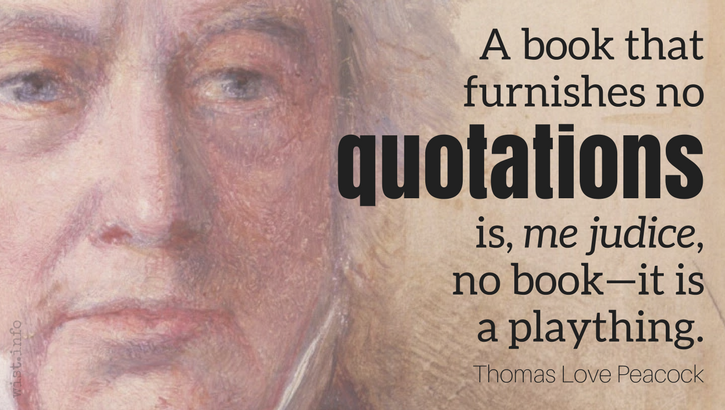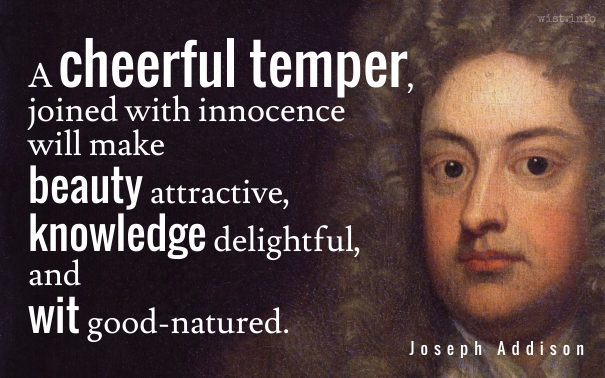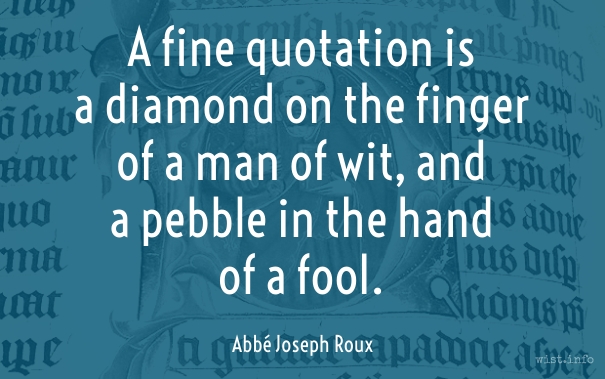Making a book is a craft, like making a clock; it needs more than native wit to become an author.
[C’est un métier que de faire un livre, comme de faire une pendule: il faut plus que de l’esprit pour être auteur.]
Jean de La Bruyère (1645-1696) French essayist, moralist
The Characters [Les Caractères], ch. 1 “Of Works of the Mind [Des Ouvrages de l’Esprit],” § 3 (1.3) (1688) [tr. Stewart (1970)]
(Source)
(Source (French)). Alternate translations:
To make a Book, is like making a Pendulum, a Man must have Experience, as well as Wit to succeed in it.
[Bullord ed. (1696)]
Tis as much a Trade to make a Book, as to make a Watch; there's something more than Wit requisite to make an Author.
[Curll ed. (1713)]
To make a Book, is no less a Trade than to make a Clock; something more than Wit is necessary to form an Author.
[Browne ed. (1752)]
To make a book is as much a trade as to make a clock; something more than intelligence is required to become an author.
[tr. Van Laun (1885)]
Quotations about:
wit
Note not all quotations have been tagged, so Search may find additional quotes on this topic.
The mania afflicting most French people is the desire to be witty, and the mania afflicting those who want to be witty is the desire to write books.
However, this is a very bad idea.
[La fureur de la plupart des François, c’est d’avoir de l’esprit ; et la fureur de ceux qui veulent avoir de l’esprit, c’est de faire des livres.
Cependant il n’y a rien de si mal imaginé.]Charles-Lewis de Secondat, Baron de Montesquieu (1689-1755) French political philosopher
Persian Letters [Lettres Persanes], Letter 66, Rica to *** (1721) [tr. MacKenzie (2014), No. 64]
(Source)
(Source (French)). Alternate translations:
The Predominant Passion or rather Fury of most of the French is, to be thought Wits; and the Predominant passion of those who would be thought Wits, is to write Books.
And yet there is nothing so ill-contrived.
[tr. Ozell (1736 ed.), No. 64]
The passion of most of the French is to be taken for wits, and the passion of thole who would be thought wits, is to write books. And yet there is nothing so badly imagined.
[tr. Floyd (1762)]
The passion of nearly every Frenchman, is to pass for a wit; and the passion of those who wish to be thought wits, is to write books.
There never was such an erroneous idea.
[tr. Davidson (1891)]
The passion of most Frenchmen is to be thought wits ; and the passion of those who wish to be thought wits is to write books.
It is impossible to imagine a more unfortunate mania.
[tr. Betts (1897)]
The passion of most of the French is to be thought witty, and the passion of those who wish to be considered wits is to write books.
A worse misconception cannot be imagined.
[tr. Healy (1964)]
Most Frenchmen are desperately eager to be thought witty and, of those who seek to be witty, most are desperately eager to write a book.
No plan, however, could be less well conceived.
[tr. Mauldon (2008), No. 64]
An elegant writer has observed, that wit may do very well for a mistress, but that he should prefer reason for a wife. He that deserts the latter, and gives himself up entirely to the guidance of the former, will certainly fall into many pitfalls and quagmires, like him, who walks by flashes of lightning, rather than by the steady beams of the sun.
Charles Caleb "C. C." Colton (1780-1832) English cleric, writer, aphorist
Lacon: Or, Many Things in Few Words, Vol. 1, § 71 (1820)
(Source)
It is a sad thing when men have neither enough intelligence to speak well nor enough sense to hold their tongues.
[C’est une grande misère que de n’avoir pas assez d’esprit pour bien parler, ni assez de jugement pour se taire.]Jean de La Bruyère (1645-1696) French essayist, moralist
The Characters [Les Caractères], ch. 5 “Of Society and Conversation [De la Société et de la Conversation],” § 18 (5.18) (1688) [tr. Van Laun (1885)]
(Source)
(Source (French)). Alternate translations:
'Tis a sad thing when Men have neither Wit enough to speak well, nor Sense enough to hold their tongues.
[Bullord ed. (1696)]
'Tis a sad thing when Men have neither Wit enough to speak well, nor Judgment enough to hold their Tongues.
[Curll ed. (1713)]
It is a sad Thing when Men have neither Wit to speak well, nor Judgment to hold their Tongues.
[Browne ed. (1752)]
It is a great misfortune to have neither wit enough to talk well nor sense enough to keep silence.
[tr. Stewart (1970)]
The next best thing to being clever is being able to quote some one who is.
Mary Pettibone Poole (fl. 1930s) American aphorist
A Glass Eye at a Keyhole, “Excess Prophets” (1938)
(Source)
Ideal conversation must be an exchange of thought, and not, as many of those who worry most about their shortcomings believe, an eloquent exhibition of wit or oratory.
Emily Post (1872-1960) American author, columnist [née Price]
Etiquette: The Blue Book of Social Usage, ch. 6 “The Art of Conversation” (1922; 1955 10th ed.)
(Source)
I have just now come from a party where I was its life and soul; witticisms streamed from my lips, everyone laughed and admired me, but I went away — yes, the dash should be as long as the radius of the earth’s orbit ——————————— and wanted to shoot myself.
Søren Kierkegaard (1813-1855) Danish philosopher, theologian
Journal (1836-04) [tr. Hannay (1982)]
(Source)
Papieren: 1 A 161; KJN: NB 2:53. Alternate translations:
I have just returned from a party of which I was the life and soul; wit poured from my lips, everyone laughed and admired me -- but I went away -- and the dash should be as long as the earth's orbit ——————————— and wanted to shoot myself.
[tr. Dru (1938)]
I have just come back from a party where I was the life and soul. Witticisms flowed from my lips. Everyone laughed and admired me -- but I left, yes, that dash should be as long as the radii of the earth's orbit ——————————— and wanted to shoot myself.
[tr. Hannay (1996)]
Wit is cultured insolence.
[ἡ γὰρ εὐτραπελία πεπαιδευμένη ὕβρις ἐστίν.]
Aristotle (384-322 BC) Greek philosopher
Rhetoric [Ῥητορική; Ars Rhetorica], Book 2, ch. 12, sec. 16 (2.12.16) / 1389b.11 (350 BC) [tr. Freese (1926)]
(Source)
(Source (Greek)). Alternate translations:
People in France have a phrase: “Spirit of the Stairway.” In French: Esprit d’Escalier. It means that moment when you find the answer but it’s too late. So you’re at a party and someone insults you. You have to say something. So, under pressure, with everybody watching, you say something lame. But the moment you leave the party …
As you start down the stairway, then — magic. You come up with the perfect thing you should’ve said. The perfect crippling put down.
That’s the Spirit of the Stairway.
The trouble is, even the French don’t have a phrase for the stupid things you actually do say under pressure. Those stupid, desperate things you actually think or do.
If with the literate I am
Impelled to try an epigram,
I never seek to take the credit;
We all assume that Oscar said it.Dorothy Parker (1893-1967) American writer
‘A Pig’s-Eye View of Literature: Oscar Wilde,” Life (2 Jun 1927)
(Source)
Reprinted in Sunset Gun (1928).
Thare would be a grate supply ov wit and humor in this world, if we would only giv others the same credit for being witty that we claim for ourselfs.
[There would be a great supply of wit and humor in this world, if we would only give others the same credit for being witty that we claim for ourselves.]
Josh Billings (1818-1885) American humorist, aphorist [pseud. of Henry Wheeler Shaw]
Everybody’s Friend, Or; Josh Billing’s Encyclopedia and Proverbial Philosophy of Wit and Humor, “Mollassis Kandy” (1874)
(Source)
There is no possibility of being witty without a little ill-nature; the malice in a good thing is the barb that makes it stick.
Richard Brinsley Sheridan (1751-1816) Irish dramatist, satirist, politician
The School for Scandal, Act 1 (1777)
(Source)
My quarrel with him is, that his works contain nothing worth quoting; and a book that furnishes no quotations is, me judice, no book — it is a plaything.
Thomas Love Peacock (1785-1866) English novelist, satirist, poet, merchant
Crochet Castle, ch. 9 (1831)
(Source)
POLONIUS: Brevity is the soul of wit.
William Shakespeare (1564-1616) English dramatist and poet
Hamlet, Act 2, sc. 2, l. 97 (2.2.97) (c. 1600)
(Source)
In full, from the least brief-speaking character in the play:
Therefore, since brevity is the soul of wit,
And tediousness the limbs and outward flourishes,
I will be brief ...."
A fine quotation is a diamond on the finger of a man of wit, and a pebble in the hand of a fool.
Joseph Roux (1834-1886) French Catholic priest
Meditations of a Parish Priest: Thoughts, Part 1, #74 (1886)
(Source)
Wit lies in recognizing the resemblance among things which differ and the difference between things which are alike.
[L’esprit consiste à connaître la ressemblance des choses diverses et la différence des choses semblables.]
Alas, irreverence has been subsumed by mere grossness, at least in the so-called mass media. What we have now — to quote myself at my most pretentious — is a nimiety of scurrility with a concomitant exiguity of taste. For example, the freedom (hooray!) to say almost anything you want on television about society’s problems has been co-opted (alas!) by the freedom to talk instead about flatulence, orgasms, genitalia, masturbation, etc., etc., and to replace real comment with pop-culture references and so-called “adult” language. Irreverence is easy — what’s hard is wit.
Men are contented to be laughed at for their wit, but not for their folly.
Jonathan Swift (1667-1745) English writer and churchman
“Thoughts on Various Subjects” (1706)
(Source)
As nothing is more provoking to some tempers than raillery, a prudent person will not always be satirically witty where he can, but only where he may without offence. For he will consider the that the finest stroke of raillery is but a witticism; and that there is hardly any person so mean, whose good will is not preferable to the pleasure of a horse-laugh.
James Burgh (1714-1775) British politician and writer
The Dignity of Human Nature, Sec. 5 “Miscellaneous Thoughts on Prudence in Conversation” (1754)
(Source)
Wit without humanity degenerates into bitterness. Learning without prudence into pedantry.
James Burgh (1714-1775) British politician and writer
The Dignity of Human Nature, Sec. 5 “Miscellaneous Thoughts on Prudence in Conversation” (1754)
(Source)
Digression is the soul of wit. Take the philosophic asides away from Dante, Milton or Hamlet’s father’s ghost and what stays is dry bones.
Ray Bradbury (1920-2012) American writer, futurist, fabulist
Fahrenheit 451, “Coda” Afterword (1979 ed.)
(Source)
A play on Shakespeare's words.
It is of no use to possess a lively wit if it is not of the right proportion: the perfection of a clock is not to go fast, but to be accurate.
Luc de Clapiers, Marquis de Vauvenargues (1715-1747) French moralist, essayist, soldier
Reflections and Maxims [Réflexions et maximes] (1746) [tr. Lee (1903)]
(Source)
‘Tis an old maxim in the schools,
That flattery’s the food of fools;
Yet now and then your men of wit
Will condescend to take a bit.Jonathan Swift (1667-1745) English writer and churchman
“Cadenus and Vanessa,” l. 766ff (1713)
(Source)
It takes a clever man to hide his cleverness.
[C’est une grande habileté que de savoir cacher son habileté.]
François VI, duc de La Rochefoucauld (1613-1680) French epigrammatist, memoirist, noble
Réflexions ou sentences et maximes morales [Reflections; or Sentences and Moral Maxims], ¶245 (1678) [tr. Heard (1917), ¶253]
(Source)
In the 1665 edition, this read: Le plus grand art d’un habile homme est celui de savoir cacher son habileté.
(Source (French)). Alternate translations:
It is a Great Act of Wisdom to be able to Conceal one's being Wise.
[tr. Stanhope (1694), ¶246]
It requires no small degree of ability to know when to conceal it.
[pub. Donaldson (1783), "Ability," ¶4]
It is a great ability to be able to conceal one's ability.
[ed. Gowens (1851), ¶257]
There is great ability in knowing how to conceal one's ability.
[tr. Bund/Friswell (1871), ¶245]
It is the height of art to conceal art.
[tr. Stevens (1939), ¶245]
A very clever man will know how to hide his cleverness.
[tr. FitzGibbon (1957), ¶245]
It is exceedingly clever to know how to hide your cleverness.
[tr. Kronenberger (1959), ¶245]
To conceal ingenuity is ingenuity indeed.
[tr. Tancock (1959), ¶245]
It is great cleverness to know how to hide our cleverness.
[tr. Whichello (2016), ¶245]
ROSENCRANTZ: Many wearing rapiers are afraid of goosequills.
William Shakespeare (1564-1616) English dramatist and poet
Hamlet, Act 2, sc. 2, l. 366ff (2.2.366) (c. 1600)
(Source)
She had a pretty gift for quotation, which is a serviceable substitute for wit.
W. Somerset Maugham (1874-1965) English novelist and playwright [William Somerset Maugham]
“The Creative Impulse” (1931)
(Source)
The original version of the story in Harper's Bazaar (Aug 1926) does not include this phrase. (The story may also be the origin of the phrase "who-done-it" / "whodunit" for a mystery.)
Variant: "The ability to quote is a serviceable substitute for wit."
The even-more-brief "Quotation is a serviceable substitute for wit" is often misattributed to Oscar Wilde, George Bernard Shaw, and Voltaire; it is not found in their works.
More discussion about this quotation: Quotation Is a Serviceable Substitute for Wit – Quote Investigator.
‘Twas the saying of an ancient Sage, “That Humour was the only Test of Gravity, and Gravity of Humour. For a Subject which would not bear Raillery is suspicious; and a Jest which would not bear a serious Examination is certainly false Wit.”
Anthony Cooper, 3rd Earl of Shaftesbury (1671-1713) English politician and philosopher
Sensus Communis: An Essay on the Freedom of Wit and Humour, Part 1, Sec. 5 (1709)
(Source)
Often incorrectly attributed to Aristotle. Shaftesbury, according to his footnote, is paraphrasing from Aristotle quoting Gorgias Leontinus. The Latin translation is "Seria risu, risum seriis discutere" ("In arguing one should meet serious pleading with humor, and humor with serious pleading"). Shaftesbury's second sentence is his own commentary.
In Lord Chesterfield, in a letter to his son (6 Feb 1752), rendered it, "Ridicule is the best test of truth."

































